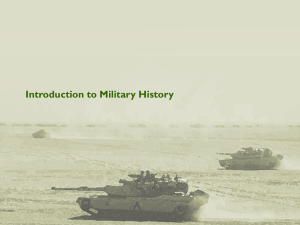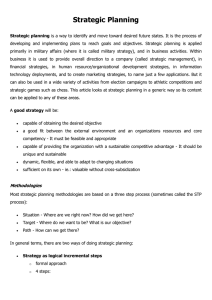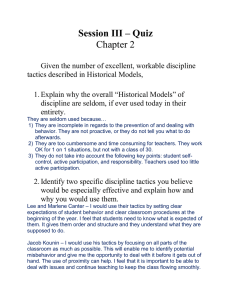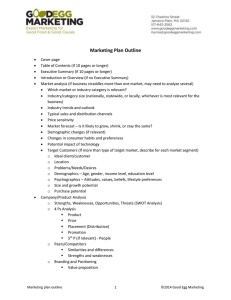NZQA registered unit standard 20813 version 2 Page 1 of 5
advertisement
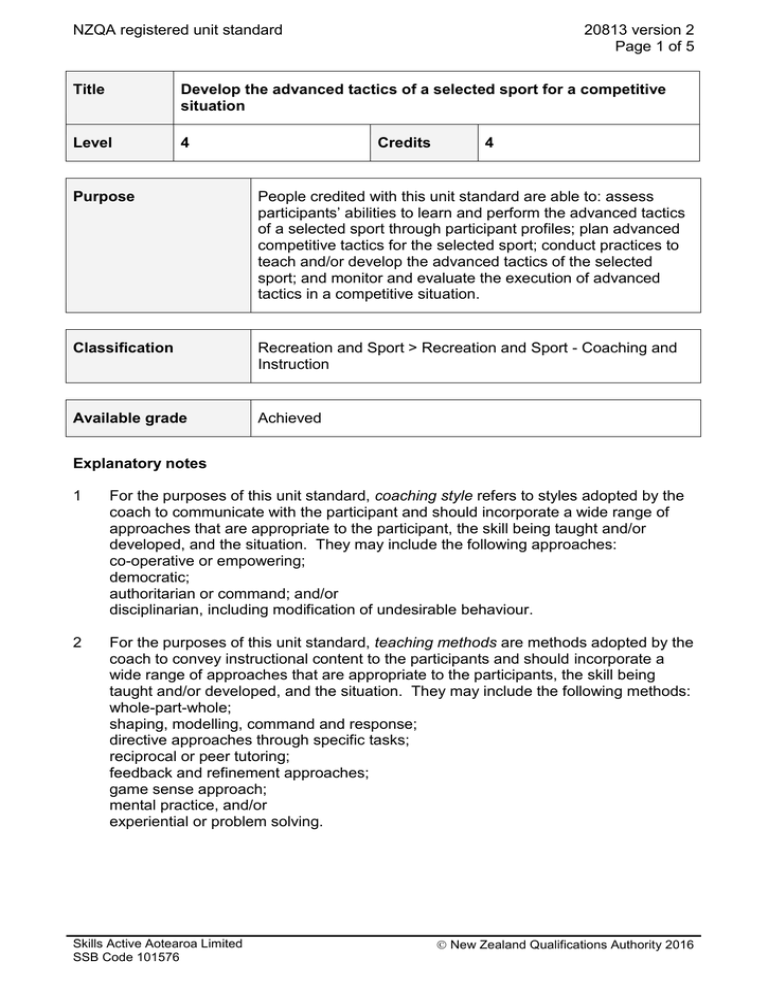
NZQA registered unit standard 20813 version 2 Page 1 of 5 Title Develop the advanced tactics of a selected sport for a competitive situation Level 4 Credits 4 Purpose People credited with this unit standard are able to: assess participants’ abilities to learn and perform the advanced tactics of a selected sport through participant profiles; plan advanced competitive tactics for the selected sport; conduct practices to teach and/or develop the advanced tactics of the selected sport; and monitor and evaluate the execution of advanced tactics in a competitive situation. Classification Recreation and Sport > Recreation and Sport - Coaching and Instruction Available grade Achieved Explanatory notes 1 For the purposes of this unit standard, coaching style refers to styles adopted by the coach to communicate with the participant and should incorporate a wide range of approaches that are appropriate to the participant, the skill being taught and/or developed, and the situation. They may include the following approaches: co-operative or empowering; democratic; authoritarian or command; and/or disciplinarian, including modification of undesirable behaviour. 2 For the purposes of this unit standard, teaching methods are methods adopted by the coach to convey instructional content to the participants and should incorporate a wide range of approaches that are appropriate to the participants, the skill being taught and/or developed, and the situation. They may include the following methods: whole-part-whole; shaping, modelling, command and response; directive approaches through specific tasks; reciprocal or peer tutoring; feedback and refinement approaches; game sense approach; mental practice, and/or experiential or problem solving. Skills Active Aotearoa Limited SSB Code 101576 New Zealand Qualifications Authority 2016 NZQA registered unit standard 20813 version 2 Page 2 of 5 3 In the context of this unit standard, feedback should involve the participant and may be verbal, written, visual, and/or tactile. It must be appropriate to the participant, timely, constructive, address information pertinent to technical adjustments, and provide information regarding progress. 4 Definitions Advanced tactics are tactics that build on the intermediate tactics and that are required to participate in the selected sport at senior representative level. Coachable moments are situations that occur in a drill or performance that the coach can use to demonstrate the concept or skill being developed. The coach may see a critical incident occur (success or failure) and use a variety of strategies to praise, or further develop or alter a performance. Practices are designed to develop the advanced tactics of the selected sport. They may include advanced drills and activities, or relevant modified games. They should show a sequential progression to implementation in a competitive situation. 5 In the context of this unit standard, feedback may be verbal, written, visual, and/or tactile. It must address information pertinent to execution of the advanced tactics. 6 Underpinning knowledge and skills relevant to this unit standard include the advanced tactics of the sport in order to teach or develop these in participants; knowledge of the advanced rules of the sport in order to teach and develop tactics that comply with the rules and regulations of the selected sport and competitive event; and knowledge of basic skill acquisition principles and concepts. 7 Competency in this unit standard must be demonstrated in a real sport coaching or teaching environment. Outcomes and evidence requirements Outcome 1 Assess participants’ abilities to learn and perform the advanced tactics of a selected sport and record through participant profiles. Evidence requirements 1.1 Advanced tactics identified for development comply with the rules and regulations of the selected sport and competitive event. 1.2 Assessment identifies factors that affect participants’ abilities to learn and perform the advanced tactics in relation to own ability. Range 1.3 factors include but are not limited to – chronological age; previous experiences; physical capacity; stage of growth and development; equipment; tactical, emotional, intellectual, and social skills. Assessment methods used determine the participants’ abilities to learn and perform advanced tactics. Range assessment methods include but are not limited to – observation, communication with participants. Skills Active Aotearoa Limited SSB Code 101576 New Zealand Qualifications Authority 2016 NZQA registered unit standard 1.4 20813 version 2 Page 3 of 5 Participant profiles record the participants’ abilities to learn and perform the advanced tactics showing consideration of the influencing factors identified. Range participant profiles include but are not limited to – tactical, technical, physical, and psychological aspects. Outcome 2 Plan advanced competitive tactics for the selected sport. Evidence requirements 2.1 Assessment of participants coached identifies their strengths and weaknesses in relation to the planned tactics. Range 2.2 strengths and weaknesses include but are not limited to – physical, psychological, tactical, technical, and leadership skills. Assessment of the opposition (in sports in which the information will affect the participants’ performances) identifies opposition strengths and weaknesses in relation to the planned tactics. Range strengths and weaknesses include but are not limited to – physical, psychological, tactical, technical, and leadership skills. 2.3 Advanced competitive tactics planned match ability of participants coached to learn and perform, and are appropriate to profiles of participants coached and the opposition, where relevant. 2.4 Strategies developed to overcome potential barriers to communication with players during a competition are within the rules and regulations of the competition. Range potential barriers may include but are not limited to – background noise, time availability, stress level of coach and the competitors, information overload; strategies may include but are not limited to – sign language, timeouts, competitors in charge in competitive environment. Outcome 3 Conduct practices to teach and/or develop the advanced tactics of the selected sport. Evidence requirements 3.1 Selected teaching strategies and coaching style match the participants’ profiles and are appropriate to the tactics to be taught and the equipment available. Range teaching strategies and coaching style may include but are not limited to – demonstration, explanation, discussion, questioning, instruction, feedback, exploration, game sense. Skills Active Aotearoa Limited SSB Code 101576 New Zealand Qualifications Authority 2016 NZQA registered unit standard 3.2 Psychological preparation develops participants’ abilities to understand the interactive process involved in tactical aspects of the sport. Range 3.3 20813 version 2 Page 4 of 5 psychological preparation may include but is not limited to – motivation, goal setting, visualisation, arousal control, decision making. Practices allow for repeated performance of the advanced tactics and maximum participation by all participants. Range practices may include but are not limited to – drills, activities, modified games. 3.4 Observation throughout the practice identifies errors in execution of the advanced tactics. 3.5 Provision of feedback is timely and relevant to the performance. Range 3.6 feedback may include but is not limited to – identification of correct execution, positive reinforcement of correct execution, identification of errors, correction of errors, identification of difference between the error and correct performance; provision of feedback may include but is not limited to – games sense approach, requiring participants to achieve a new or different outcome. Observation identifies coachable moments which are utilised to provide relevant feedback. Outcome 4 Monitor and evaluate the execution of advanced tactics in a competitive situation. Evidence requirements 4.1 Monitoring of participants’ execution of the advanced tactics throughout the competitive event identifies their effectiveness. Range 4.2 monitoring may include but is not limited to – physical, psychological, tactical, and leadership skills of participants coached and opposition; winning or losing; close or unbalanced competitive situation. Implementation of intervention and communication strategies is in accordance to the results of monitoring. Range interventions may include but are not limited to – substitution of participants, positional changes, modifications to tactics, counter tactics, switch to alternative tactics. Skills Active Aotearoa Limited SSB Code 101576 New Zealand Qualifications Authority 2016 NZQA registered unit standard 4.3 20813 version 2 Page 5 of 5 Evaluation following the event identifies areas requiring further emphasis and/or attention for implementation in future events. evaluation methods include – post-event de-briefing, coach selfevaluation, participant feedback; evaluation methods may include – video recording of participants’ performance in the event, video recording of opposition’s performance in the event, feedback from an observer, objective measuring system. Range Planned review date 31 December 2012 Status information and last date for assessment for superseded versions Process Version Date Last Date for Assessment Registration 1 26 April 2005 31 December 2012 Rollover and Revision 2 20 May 2011 N/A Consent and Moderation Requirements (CMR) reference 0099 This CMR can be accessed at http://www.nzqa.govt.nz/framework/search/index.do. Please note Providers must be granted consent to assess against standards (accredited) by NZQA, before they can report credits from assessment against unit standards or deliver courses of study leading to that assessment. Industry Training Organisations must be granted consent to assess against standards by NZQA before they can register credits from assessment against unit standards. Providers and Industry Training Organisations, which have been granted consent and which are assessing against unit standards must engage with the moderation system that applies to those standards. Requirements for consent to assess and an outline of the moderation system that applies to this standard are outlined in the Consent and Moderation Requirements (CMRs). The CMR also includes useful information about special requirements for organisations wishing to develop education and training programmes, such as minimum qualifications for tutors and assessors, and special resource requirements. Comments on this unit standard Please contact Skills Active Aotearoa Limited info@skillsactive.org.nz if you wish to suggest changes to the content of this unit standard. Skills Active Aotearoa Limited SSB Code 101576 New Zealand Qualifications Authority 2016
